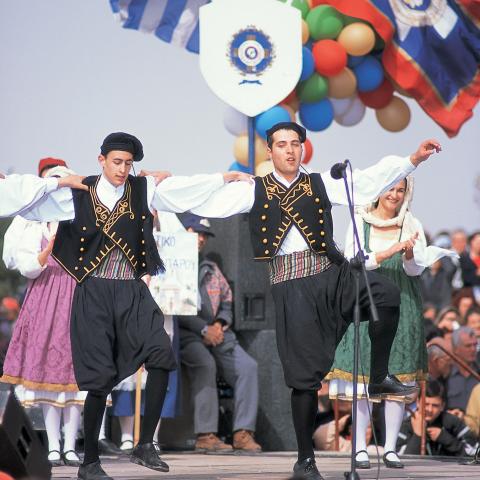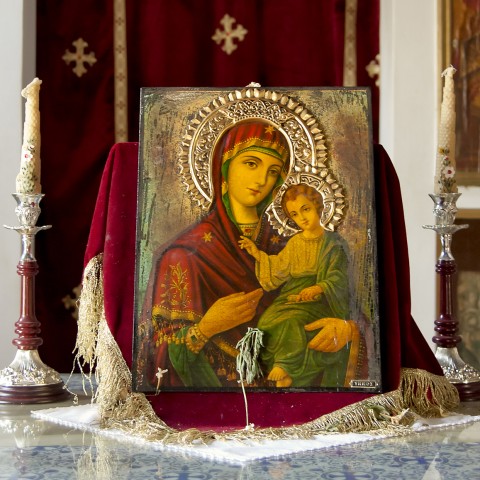Each year, when many countries are celebrating Assumption Day, Greece holds Dormition Day celebrations. This holiday, also called the day of the Dormition of the Theotokos, is when most of Greece remembers the death of the Virgin Mary and her subsequent resurrection three days later.
If you’re asking yourself “What is Assumption Day, and how does it actually differ from Dormition?” consider this. While similar to the Assumption of Mary Day, Dormition has a greater focus on her death and resurrection, as opposed to only her assumption into Heaven.
Learn all about the Dormition of the Mother of God with GreekPod101.com, and increase your understanding of Greece’s fascinating culture and tradition. After all, this is the first step in truly mastering a language!
1. What is the Dormition of the Mother of God?
In the heart of the Greek summer, we celebrate with special solemnity the Dormition of the Mother of God, otherwise called Dekapendávgustos. In other words, the death of the Virgin Mary.
This Marian holiday is an official public holiday and is a day of joy rather than mourning, because the Virgin Mary was resurrected just like Christ. This is why it’s also called the Easter of Summer.
According to the religious tradition, the Virgin Mary was informed about her imminent death three days before by an angel. So she prepared herself, gave away all of her belongings, and prayed in the Mount of Olives. On the day of her death, not all of the Apostles were in Jerusalem, but a cloud took them and brought them close to her. After she died, the Apostles carried and buried her remains in the garden of Gethsemane. Three days later, the tomb was empty. The Virgin Mary was resurrected.
Is the Assumption a holy day of obligation?
Yes; the only exception is that if the date happens to fall on a Monday or Saturday, people aren’t expected to attend the mass for Assumption or Dormition.
2. When is Dormition?
Each year, the Dormition of the Mother of God is celebrated in Greece on August 15. This is the same date as the very similar Assumption Feast Day.
3. How is it Celebrated?
Since August is mainly a month of vacations and most Greeks are out of the cities, the celebrations of the Fifteen of August are especially intense in the islands and provinces, most notably wherever there is a church devoted to the Virgin Mary.
For example, every year, the church of Panagia Soumela in Imathia and the Ekatontapyliani in Paros “sink” from all the visitors. In Paros especially, a huge celebration is held, while dozens of traditional fishing boats with lit torches fill up the small picturesque port of Naousa.
The largest pilgrimage happens at the church of Megalohari in Tinos. There, thousands of faithful believers go up the paved road to the church. On the right, a mat is laid for those who go up the road on their knees in order to fulfill their votive offerings to the Virgin Mary. If you ever find yourself there, you’ll see people with wounded knees and tears in their eyes, who continue to go on through the strength of their faith. The celebrations culminate in the majestic procession and litany of the miraculous Holy Icon of Megalohari.
In Markopoulo of Cephalonia at the dome of the church, the harmless little snakes of the Virgin Mary appear. Greeks believe that the Virgin Mary transformed the nuns of an old monastery into snakes, to help them escape from the pirates.
4. Name Days
Do you know who has their name day on August 15?
The most popular names are Maria, Marios, Panagiota, Panagiotis, and Despina—all names that are related to the Virgin Mary. Maria is by far the most popular female name in Greece, something that shows the deep respect Greeks have for the Virgin Mary.
5. Vocabulary You Need to Know for Dormition
Here’s some vocabulary you should know for the Dormition of the Mother of God holiday in Greece!
- Εκκλησία (eklisía) — “church”
- Κοίμηση της Θεοτόκου (Kímisi tis Theotóku) — “Dormition of the Mother of God”
- Νηστεία (nistía) — “fasting”
- θρησκευτική εικόνα (thriskeftikí ikóna) — “religious icon”
- Παναγία (Panayía) — “Virgin Mary”
- λιτάνευση της ιερής εικόνας (litánefsi tis ierís ikónas) — “procession of the holy icon”
- Θαύμα (thávma) — “miracle”
- εικόνα της Παναγίας (ikóna tis Panayías) — “icon of the Virgin Mary”
- Πάσχα του καλοκαιριού (Pascha tu kalokeriú) — “Easter of the summer”
- Λειτουργία (Lituryía) — “church service”
- Πιστός (pistós) — “believer”
- Δεκαπενταύγουστος (Dekapendávgustos) — “August 15”
- Αργία (aryía) — “holiday”
- Πανηγύρι (paniyíri) — “fete”
- Τάμα (táma) — “votive offering”
- Ιερέας (ieréas) — “priest”
To hear each vocabulary word pronounced, check out our Greek Dormition of the Mother of God vocabulary list!
Conclusion: How GreekPod101 Can Help You Master Greek
We hope this lesson gave you a fresh perspective on the strong faith of the Greek people in both their daily life, and during their most important religious holidays. Does your country celebrate Dormition (or Assumption)? If so, are celebrations similar or very different? Let us know in the comments!
To continue learning about Greek culture and the language, explore GreekPod101.com, and take advantage of an array of fun and practical learning tools:
- Insightful blog posts on a variety of language and cultural topics
- Free vocabulary lists covering a range of themes
- Podcasts to improve your listening and pronunciation skills
- Mobile apps to learn Greek wherever you are, and whenever
- Much, much more!
If you prefer a one-on-one learning approach, or would like to give it a try, be sure upgrade to Premium Plus. By doing so, you can start learning Greek with your own personal teacher and a personalized plan based on your needs and goals. Yes, really!
Greek is a lovely language and one that encompasses a deep, unique culture. It may be hard now, but know that once you’ve got it mastered, it’ll be all worth it. Best wishes from GreekPod101!













